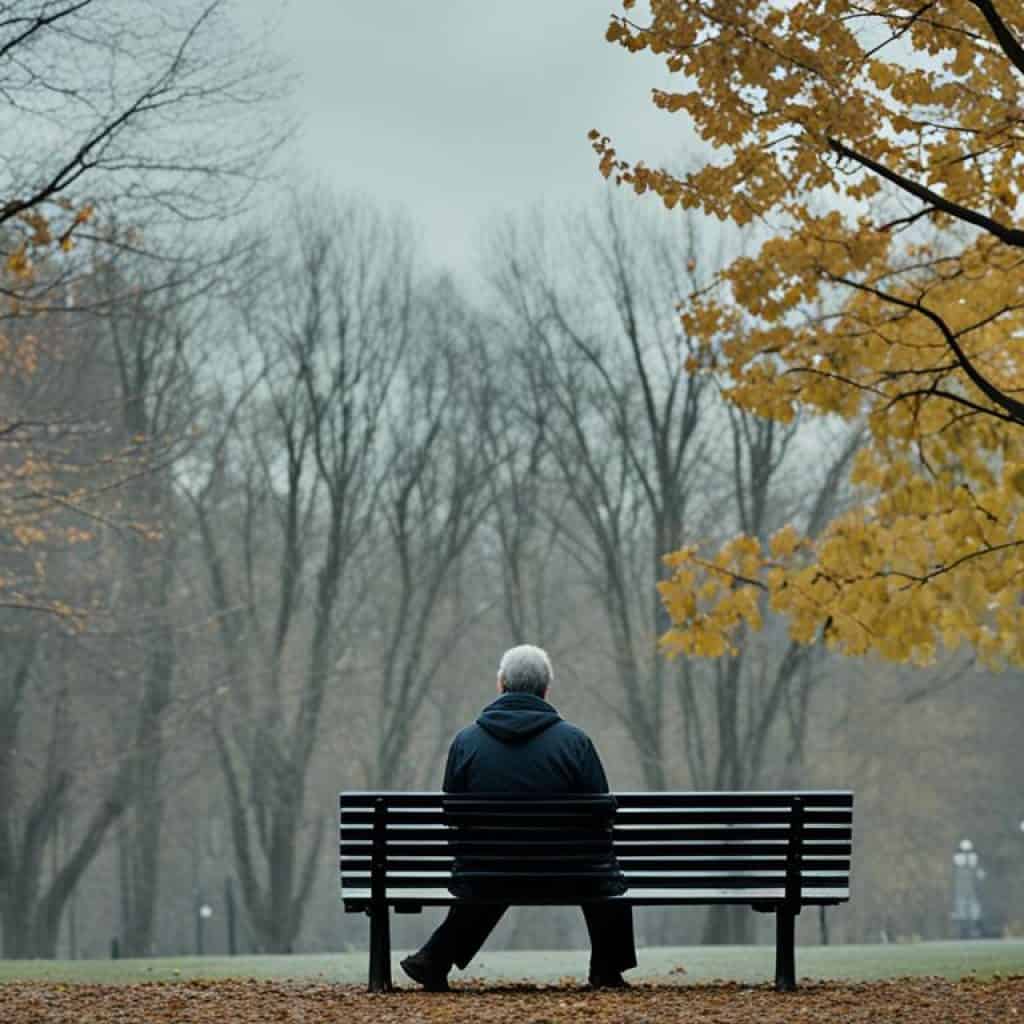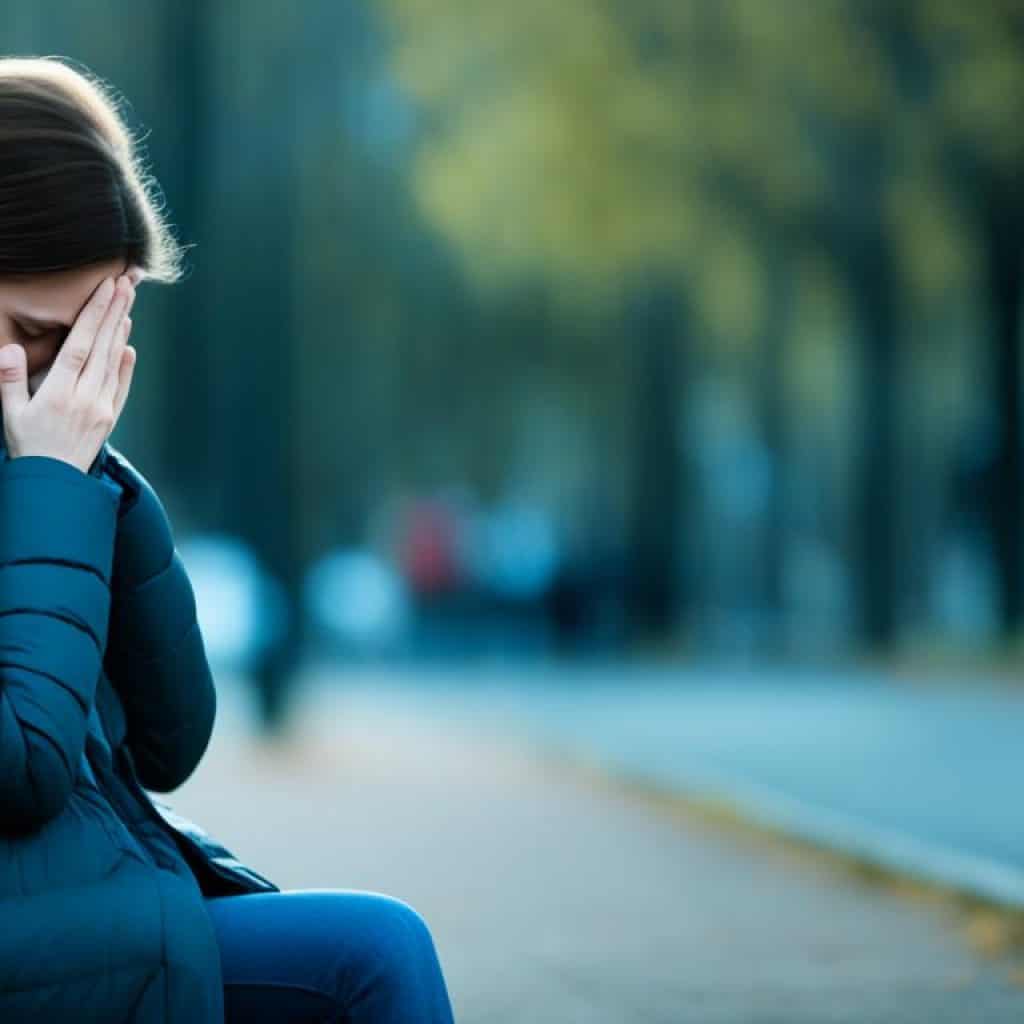The pain of divorce can last long after the legal process ends1. More than half of people feel deep grief after a divorce, like losing someone close1. Even though your marriage ends, the emotional impact can stay for years. You’ll go through various stages of grief, feeling shock, rejection, and more2.
Healing from a divorce is a personal journey. You might struggle with feelings of being left out and rejected, pulling away from friends, getting angry, or not taking care of yourself1. For some, grief can be very tough, with about 30% thinking about harming themselves or others1.
Key Takeaways:
- Divorce grief can last for years, with intense emotions similar to the loss of a loved one.
- Common feelings include shock, rejection, abandonment, isolation, and confusion.
- Withdrawal, anger, decreased self-care, and suicidal thoughts are potential long-term effects.
- Engaging with a therapist or support group can help over 70% of individuals cope and move on.
- Self-care practices like journaling, meditation, and new hobbies can aid healing for around 65% of divorcées.
The Emotional Aftermath of Divorce
Divorce can be very tough, bringing a mix of complex feelings. People often go through grief, resentment, anger, and stress. These feelings can affect both their mental and physical health deeply.
Grief, Resentment, Anger, Disillusionment, Stress, Loneliness, Guilt
After a divorce, people may feel many emotions like grief, anger, and loneliness3. The process can be stressful, making people feel like they have PTSD4. These feelings are usually strongest right after the divorce but can still affect health later on4.
Recovering from a divorce goes through stages like denial and acceptance4. This journey can take a long time, sometimes years5.
Long-term Physical and Mental Health Implications
Divorce is very stressful, second only to losing a loved one4. It can harm both physical and mental health for a long time4. Women who have been divorced for ten years might feel sicker than those who stayed married4. Both men and women may face more health problems, depression, and substance abuse after a decade post-divorce4.
Not dealing with divorce emotions can come from deeper issues like mental health problems or past traumas4. Issues like ongoing arguments with an ex over parenting can make healing harder4. Changes in money, social life, and where you live can also affect you long after the divorce4.
Dealing with the emotional effects of divorce is complex and personal. It’s important to understand the long-term effects and get support. This can help with healing and moving forward.
The Stages of Divorce Grief
Going through a divorce is tough and complex. It often follows the Kübler-Ross model, which talks about denial, anger, bargaining, depression, and acceptance67.
Denial, Anger, and Bargaining
At first, people might be in denial, finding it hard to accept the split7. This helps them slowly get used to the loss. Then, anger might kick in, aimed at the ex, the situation, or themselves7. Next, bargaining starts, where people think about “what if” scenarios, feel guilty, or want to fix things7.
Depression and Letting Go
Depression can hit hard, bringing deep sadness and a lack of interest in life7. It can even lead to clinical depression, affecting well-being6. As time goes on, people start to let go, accepting the divorce and looking forward to a new life6.
Acceptance and Moving Forward
Acceptance means being ready to move on and accept the new reality6. It’s a big step, not necessarily making everything okay right away. It’s about starting a new chapter and living independently from the past6.
The stages of grief aren’t always straight forward, and people might go back and forth or feel them at the same time8. Getting help, like counseling or joining a support group, can really help in this tough time6.
“The stages of grief, often following the Kubler-Ross model (“DABDA”), are characterized by denial, anger, bargaining, depression, and acceptance, which individuals may not experience in a linear fashion.”8
Knowing about the stages of divorce grief and the need for support helps people face their feelings. It can lead to coming out stronger and more resilient687.
Reasons Why Divorce Pain Lingers
Divorce is a tough and emotional journey, often leaving deep scars long after it’s over. Many people struggle with grief and pain after the divorce is finalized9.
Unresolved Mental Health Issues and Difficulty Forgiving
Unaddressed mental health issues or past traumas can make divorce pain worse9. Not being able to forgive your ex or yourself can also slow down healing9.
Co-Parenting Conflicts
Co-parenting can be tough, especially when kids are involved. Disagreements over parenting plans and schedules can keep the emotional pain alive9.
Economic and Social Changes, Relocation
Divorce often means big changes in money and social life, like living on one income or finding new friends. These changes can make healing harder9. Moving to a new place can also increase feelings of loss and sadness9.
“Divorce often leads to economic and social changes, such as living on a single income or changes in your social circle, which can add to your discomfort and make it harder to bounce back from the divorce.”9
There are many reasons why divorce pain lasts, and they differ for everyone. Understanding these can help you find the right support and strategies to move past the tough times91011.
Moving Forward: Healing and Growth Strategies
Getting over the pain of divorce is tough, but there are ways to heal and grow12. You can try professional therapy, start new hobbies, and make new friends. These steps can help you move forward and grow after divorce.
Therapy, Support Groups, Loved Ones, New Hobbies
Seeing a therapist can really help you deal with your divorce feelings12. They can help you work through issues, find ways to cope, and move towards a better mindset12. Joining a support group can also be great, connecting you with people who get what you’re going through13. Family and friends can offer a safe place to talk about your feelings13. Trying new things, like learning a new skill or joining a club, can be fun and help you meet new people.
Spiritual Growth, Exercise, Career Achievements
Looking for spiritual support, like talking to a religious leader or trying new healing methods, can bring comfort12. Staying active with exercise can also help, as it boosts your mood and mental health12. Focusing on your career or setting new goals can give you a sense of purpose and success13.
Healing and growing after divorce takes time, but with the right strategies, you can get through it121314.
“The greatest weapon against stress is our ability to choose one thought over another.” – William James
Resources for Divorce Grief Support
Going through the emotional changes after a divorce can feel tough and lonely. But, you don’t have to go through it by yourself. There are many resources available to help you deal with your feelings and get better. From websites and books to videos and groups, these tools offer great advice and support as you heal and move on.
Websites
- Divorce Care – Offers recovery support groups and resources for those going through divorce.
- Online Divorce Recovery Groups – Virtual communities where you can meet others facing similar issues.
- Therapist Locator – Helps you find mental health experts who specialize in divorce counseling and grief support.
Books
- The Divorce Recovery Workbook – A detailed guide to handling the emotional and practical sides of divorce.
- Parenting Together Apart: For the Residential Parent – Gives tips and strategies for co-parenting well after a divorce.
- Parenting Together Apart: For the Non-Residential Parent – Offers advice for non-custodial parents to keep a good relationship with their kids.
- Rebuild Your Financial Life After Divorce – Offers practical tips for getting back on your financial feet after a divorce.
Videos
- How to Recover from a Divorce You Didn’t Want – A personal story of dealing with grief and rebuilding life after an unwanted divorce.
- TedTalk: How to Recover After Divorce – Inspirational insights and strategies for healing and growth after a divorce.
There’s no one-size-fits-all way to grieve a divorce15. You might go through feelings like denial, anger, bargaining, depression, and acceptance, similar to the five stages of grief Dr. Elisabeth Kubler-Ross talked about15. Getting support, taking care of yourself, and looking into new possibilities can help you heal and grow.
A study showed that people going through divorce or widowhood felt less grief, depression, stress, bitterness, and loneliness after joining an online self-help program for three months15. Another study in 2021 found that doing rituals can help people grieve by letting them honor a lost loved one, move past a tough experience, and imagine their next chapter in life15.
You’re not alone in this journey. Talk to people you trust, join a support group, or get counseling to help you deal with the emotional parts of divorce. With time, kindness to yourself, and the right resources, you can come out of this tough time stronger and more resilient.
why am I still grieving after 3 years divorce
The emotional journey of divorce is complex and deeply personal. Even years after the legal process ends, the pain of separation can still be felt. You might ask, “Why am I still grieving after 3 years of divorce?”16 The grieving process doesn’t have a set timeline. For some, it takes longer to feel closure and acceptance.
Divorce grief is like a roller coaster of emotions – denial, anger, bargaining, depression, and acceptance. But this process isn’t always straight forward. People may go back to earlier stages without warning17. The grief can come at any time, making it hard to move on17.
One reason for ongoing grief is the unclear nature of the loss. Unlike death, divorce is a gradual end of a relationship. This leaves feelings of uncertainty17. Changes in social and economic life after divorce can also make grief worse. People have to adjust to new living situations, financial changes, and family shifts.
The time and depth of grief after divorce vary a lot from one person to another16. While most people take about 2-3 years to fully process their feelings, some take longer16. Around 20-25% of people experience this deep grief16.
If you’re still dealing with your divorce years later, you’re not alone. Healing is not a race, and everyone’s journey is different. By getting support, taking care of yourself, and feeling all your emotions, you can work through the grief. You’ll come out stronger on the other side.
“The grief can come in waves, triggered unexpectedly even after several months.”17
The Turbulent First Year of Divorce
The first year after divorce can feel like you’re lost in a thick fog. It’s hard to see what’s ahead, making you feel like you’re not in control. This feeling can make you feel like you’re being controlled by someone else18. You might go through many emotions, like feeling sad, anxious, or even losing sleep and weight19.
This year, you’ll deal with the legal and practical parts of ending your marriage. You’ll also face feelings like anger, fear, and sadness19. It’s a lot to handle, and it might feel like too much. But, this is when you start to heal and find yourself again18.
If you’re feeling lost, don’t worry, you’re not alone. Getting help from a therapist who knows about divorce recovery and joining a support group can help a lot18. Remember, the tough feelings you’re going through are normal. They come from the big change and loss of divorce20. With time and support, you can get through this tough year and start to rebuild your life.
“Disenfranchised grief refers to losses that are not publicly acknowledged, socially supported, and openly mourned. People experience disenfranchised grief when mourning the death of an ex-spouse due to the lack of societal recognition and support.”18
The emotional effects of divorce can be huge, and the first year is usually the hardest. But with the right support and a commitment to healing, you can come out of this tough time stronger and with a new purpose.
The Formative Second Year
Starting the second year after your divorce marks a key phase in healing21. It’s filled with both challenges and chances for growth. You’re still figuring out the emotional and practical sides of your new life. The first year’s shock and grief may have passed, but the second year brings new uncertainty and the need to rebuild22.
Rebuilding your identity is crucial in this year21. With your family changed, you’re exploring who you are alone. This journey of self-discovery can be tough but also very rewarding. Use this time to try new hobbies, revive old interests, or go after personal goals you delayed during your marriage22.
The second year often sees the end of the divorce process21. This milestone marks the end of your marriage but also brings closure. Remember, healing and growth don’t stop here22.
Be patient and kind to yourself as you go through this phase23. Grief can still be strong, and it’s important to give yourself time and space to feel your emotions. Reach out to friends and family, consider getting professional help if you need it, and use your resilience22.
Facing the changes and challenges of the second year can help you deeply understand yourself and your future21. With determination and kindness to yourself, you can come out of this period with a new purpose and a deeper appreciation for rebuilding after divorce22.

The second year after your divorce is a vital part of your healing21. By facing your grief, accepting changes, and growing on your own, you set the stage for a more fulfilling and empowered life22.
The Triumphant Third Year
As you enter the third year after your divorce, you might find yourself on the path to healthy healing24. Divorce rates have dropped since 2008, especially for younger couples who are sticking together more often than older couples24. The tough legal process is over, and you’re making better choices for your health after trying new things in the second year.
You might feel more stable and focused, ready to plan a new chapter in your life24. Most divorces happen around four years into a marriage, often due to lack of commitment, cheating, disagreements, or losing love24. Now, you’re likely ready for a new relationship, having worked through grief and forgiven your ex and yourself.
Arriving at Healthy Healing
While healing from divorce is never complete25, you’ve come to see your past as a time of learning and growth25. You’ve moved on and embraced a new life that’s full of possibilities. The stress and uncertainty of before have turned into stability and confidence.
You know you’re healing when past events no longer upset you25, and you’ve gone through all the stages of grief26. The ups and downs have leveled out, and you’re now focused on taking care of yourself and building a fulfilling life alone.
“Grief is a personal process that does not follow a set timeline. It’s important to take care of yourself and lean on your support system during this time of transition.”26
The third year after your divorce is a key moment in your journey to get over grief and look forward to a brighter future26. With patience, strength, and a focus on your well-being, you can come out of this tough time with a fresh sense of self and a clear vision for what’s next.
Divorce Grief: A Normal Response
Grieving the end of a marriage is a normal and common experience27. Even in amicable divorces, people often feel loss and struggle with their feelings. This grief is called “ambiguous loss” – a complex form of grief from ending a relationship28.
The grieving process after divorce is complex. It involves many feelings, like resentment, anger, guilt, and disillusionment27. The ambiguity of the loss makes finding closure hard, leading to a longer and unpredictable grieving journey28.
Ambiguous Loss and Complicated Grieving
Divorce grief is often more complex than mourning the loss of a loved one through death28. It can leave people feeling confused, unsure of who they are, and questioning their worth27. This makes the grieving process longer, as there’s no clear end to the loss.
Changes like financial adjustments, moving, and co-parenting issues can make grieving harder. People may go back and forth between different stages of grief. This makes healing and acceptance harder and more unpredictable.
It’s key to understand that the grief after a divorce is normal and valid27. Recognizing the complex nature of this grief helps people work through their feelings. This way, they can heal and grow from the experience.
“Grief is the price we pay for love.”
– Queen Elizabeth II
The Stages of Grief After Divorce
Going through the emotional changes after a divorce is tough. You might feel shock, denial, anger, bargaining, and depression29. This process is like the stages of grief Elisabeth Kübler-Ross talked about. It’s a key part of healing after a divorce.
First, you might feel in denial, like you’re numb and can’t accept what happened29. Then, anger might hit you hard, making you feel betrayed and lost29. After that, you might start bargaining, wondering what you could’ve done differently, leading to guilt and fear29.
Depression often comes next, bringing feelings of helplessness and hopelessness29. But, eventually, you reach acceptance. This is a big step towards healing29. At this point, you start to adapt and move forward with a positive outlook29.
The stages of grief after a divorce aren’t always in order, and you might go back and forth8. Everyone grieves differently, and getting help from a therapist or a support group can really help8.
Knowing about the stages of grief can help you prepare for what’s ahead and move towards healing and growth8. Remember, the tough feelings you’re having are normal reactions to a big loss. With time and support, you can build a fulfilling life again8.
“The grieving process after divorce varies for each individual, with periods of intense emotions followed by finding a new sense of identity and meaning in life through intentional actions to navigate through the grief stages.”8
| Stage of Grief | Emotional Experiences |
|---|---|
| Denial | Shock, numbness, confusion, avoidance, shutting down29 |
| Anger | Feelings of betrayal, injustice, and loss29 |
| Bargaining | Guilt, fear, blame, questioning what could have been done29 |
| Depression | Helplessness, hopelessness, changes in behavior29 |
| Acceptance | Finding clarity, adapting, and moving forward29 |
Understanding the stages of grief and their feelings can help you navigate the ups and downs of divorce. Remember, it’s not a straight line, and getting support from friends, professionals, or groups is key6. With time, kindness to yourself, and focus on healing, you can come out stronger and with a new purpose8.
Complicated Grief and When to Seek Help
Grief after a divorce is tough but normal. Yet, some people find it hard to move past the pain. Complicated grief, or persistent complex bereavement disorder, is when the sadness lasts over a year after a big loss like a divorce.
Symptoms of Complicated Grief
Signs of complicated grief include always thinking about the lost relationship, feeling it wasn’t real, losing your sense of self, and using alcohol or drugs to cope.30 It can also make you feel stuck, make daily life hard, and take away the joy from activities you used to love.31 The What’s Your Grief group says if you have three or more of these signs for over six months, you might need help.
Some things can make it more likely you’ll feel this deep grief. These include the way the divorce happened, your relationship with your ex, family issues, past losses, and mental health.31 Cruse says people caring for a loved one or those with depression are more at risk.32
About 7%-10% of adults who are grieving will keep feeling this way,32 and 5%-10% of kids and teens who lose someone close may get depression, PTSD, or prolonged grief.32 Older adults and those with a history of depression or bipolar disorder are more likely to feel this deep grief.32

If your grief doesn’t get better or stops you from living your life, getting help is a good idea. A therapist can help you work through your feelings and find ways to cope.
Remember, about 80% of people with prolonged grief disorder have trouble sleeping,32 and most caregivers with this disorder don’t get mental health help.32 Getting support can help you find meaning and move forward after a divorce.
“Three or more of these symptoms persisting beyond 6 months may be an indicator of complicated grief, prompting the consideration of seeking professional support.”
Building Resilience After Divorce
Going through a divorce is tough, but learning to be resilient helps you move forward33. Some people feel sad for a long time, like when someone dies or they lose a job33. It’s good to find new things that make you feel good about yourself33. Getting help from experts who understand emotional changes is a smart move33.
Coping Techniques and Self-Care
Getting over a divorce means learning to deal with your feelings and finding new meaning3334. You might feel many things, like not wanting to accept the change, being mad, sad, or just okay34. To deal with your grief, take your time, focus on healing yourself, and write down your feelings34. Being real with others, taking a break from dating, and finding friends who understand can help34.
- Keep track of feelings – try keeping a journal, talking to a trusted person, or simply naming your feelings as you have them.
- Establish a routine – maintain the rhythms of your life as much as possible.
- Seek professional help – whether it’s talking to a mental health professional, a lawyer, or your child’s school counselor, admit when you need some support and ask for help.
- Forgive and avoid blaming others – be honest and clear about how you feel and what you need.
- Wait on romance – get to know yourself, and focus on the activities you used to love that you still enjoy, or those you’d like to try but never have before. Don’t rush into a new relationship.
Studies show that women often spend a lot of time feeling mad after a divorce, sometimes getting stuck in this feeling35. Some people feel numb, then suddenly feel too much, and then nothing at all35. Taking charge of your own healing is a good way to get through the tough times35. Women finding their way after a divorce might find it hard to connect with themselves alone35. It’s important to accept change and learn to be okay with being alone during this time35.
“Collaborative dispute during divorce proceedings may alleviate grief, while toxic disputes can amplify feelings of loss and disruption33. Social support and connecting with others going through similar experiences can significantly reduce feelings of isolation during divorce33.”
Getting through a divorce takes time, but with the right ways to cope and take care of yourself, you can come out stronger333435. By focusing on your feelings, getting help when you need it, and embracing change, you can heal and grow333435.
Conclusion
Your divorce journey may be unique, but grieving is a common and healthy step. It helps you deal with the losses and start to process your feelings and the changes you’re going through36. You might feel the most intense emotions at first, then slowly find a new sense of self.
By taking steps to work through your grief, you can discover new meaning and build a fulfilling life37. Whether your divorce was amicable or tough, it’s a big change that needs patience, self-care, and time.
If you’re still struggling years after your divorce, talking to a mental health expert might help38. Divorce grief is complex, and getting support can greatly aid your healing and growth.
FAQ
Why am I still grieving after 3 years of divorce?
What are the common emotions experienced after a divorce?
What are the stages of recovery from a divorce?
Why does the pain of divorce linger for some people?
What strategies can help overcome divorce pain?
What resources are available for divorce grief support?
Source Links
- https://www.brides.com/reasons-the-pain-of-divorce-is-hard-to-get-over-1102713
- https://jengrice.com/divorce-is-a-death-of-someone-still-living/
- https://lifeconnectionscounseling.com/3-pivotal-first-years-divorce/
- https://www.onlinedivorce.com/blog/when-divorce-still-hurts-even-years-later/
- https://www.thegirlfriend.com/relationships/5-years-after-my-marriage-ended-im-still-not-over-it
- https://www.smedleylawgroup.com/blog/yes-youll-survive-the-stages-of-divorce-grief/
- https://www.divorcenet.com/resources/the-5-stages-of-divorce-grief.html
- https://www.verywellhealth.com/divorce-grief-5208157
- https://ask.metafilter.com/349653/When-Time-Doesnt-Help-After-A-Divorce
- https://www.scarymommy.com/grieve-after-divorce
- https://dailyplateofcrazy.com/2011/06/29/which-is-worse-death-or-divorce/
- https://becomingyouwithjulie.com/lifestyle/how-to-feel-good-again-afternbspdivorce
- https://psyche.co/guides/how-to-survive-and-thrive-through-divorce-to-a-new-life-chapter
- https://www.healthline.com/health/life-after-divorce
- https://psychcentral.com/blog/how-to-grieve-after-divorce
- https://medium.com/heart-affairs/your-deepest-divorce-grief-will-have-nothing-to-do-with-your-ex-34bee921bcb0
- https://www.psychologytoday.com/us/blog/better-divorce/202109/when-will-the-grief-after-divorce-end
- https://heartachetohealing.com/when-an-ex-spouse-dies/
- https://torronelaw.com/guide-to-the-psychological-stages-of-divorce/
- https://www.goodtherapy.org/blog/why-divorce-hurts-0914124/
- https://ask.aftertalk.com/mourning-a-former-spouse/
- https://tinybuddha.com/blog/how-grieving-my-parents-divorce-20-years-later-changed-me-for-the-better/
- https://whatsyourgrief.com/ambiguous-grief-grieving-someone-who-is-still-alive/
- https://www.healthcentral.com/sex-and-relationships/divorce
- https://elizabethkleinfeld.com/2023/04/05/divorced-versus-widowed-whats-the-difference-and-why-does-it-matter/
- https://www.styleatacertainage.com/style-at-a-certain-age/dealing-with-the-loss-of-a-partner-grief-one-year-later/
- https://psychcentral.com/blog/lost-after-divorce-how-to-get-through
- https://www.psychologytoday.com/us/blog/a-better-divorce/202401/why-do-we-experience-delayed-grief-after-a-loss-or-divorce
- https://www.modernfamilylaw.com/resources/from-shock-to-acceptance-unpacking-the-five-stages-of-divorce/
- https://whatsyourgrief.com/normal-or-not-so-normal-grief/
- https://www.cruse.org.uk/understanding-grief/effects-of-grief/complicated-grief/
- https://www.psychiatry.org/patients-families/prolonged-grief-disorder
- https://www.divorceuntangled.com/p/how-long-should-you-grieve-after
- https://www.linkedin.com/pulse/divorce-grief-what-can-you-do-carrie-doubts-ma-pcc-eli-mp
- https://mycoachdawn.com/stages-of-divorce-grief/
- https://uptoparents.org/view-article.aspx?articleid=12
- https://www.griefincommon.com/blog/grievinginthesecondyearafteraloss/
- https://secondfirsts.com/2014/06/death-vs-divorce-the-battle-of-the-giants/







Add comment